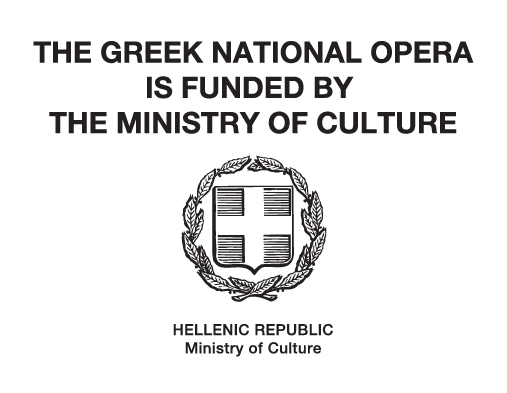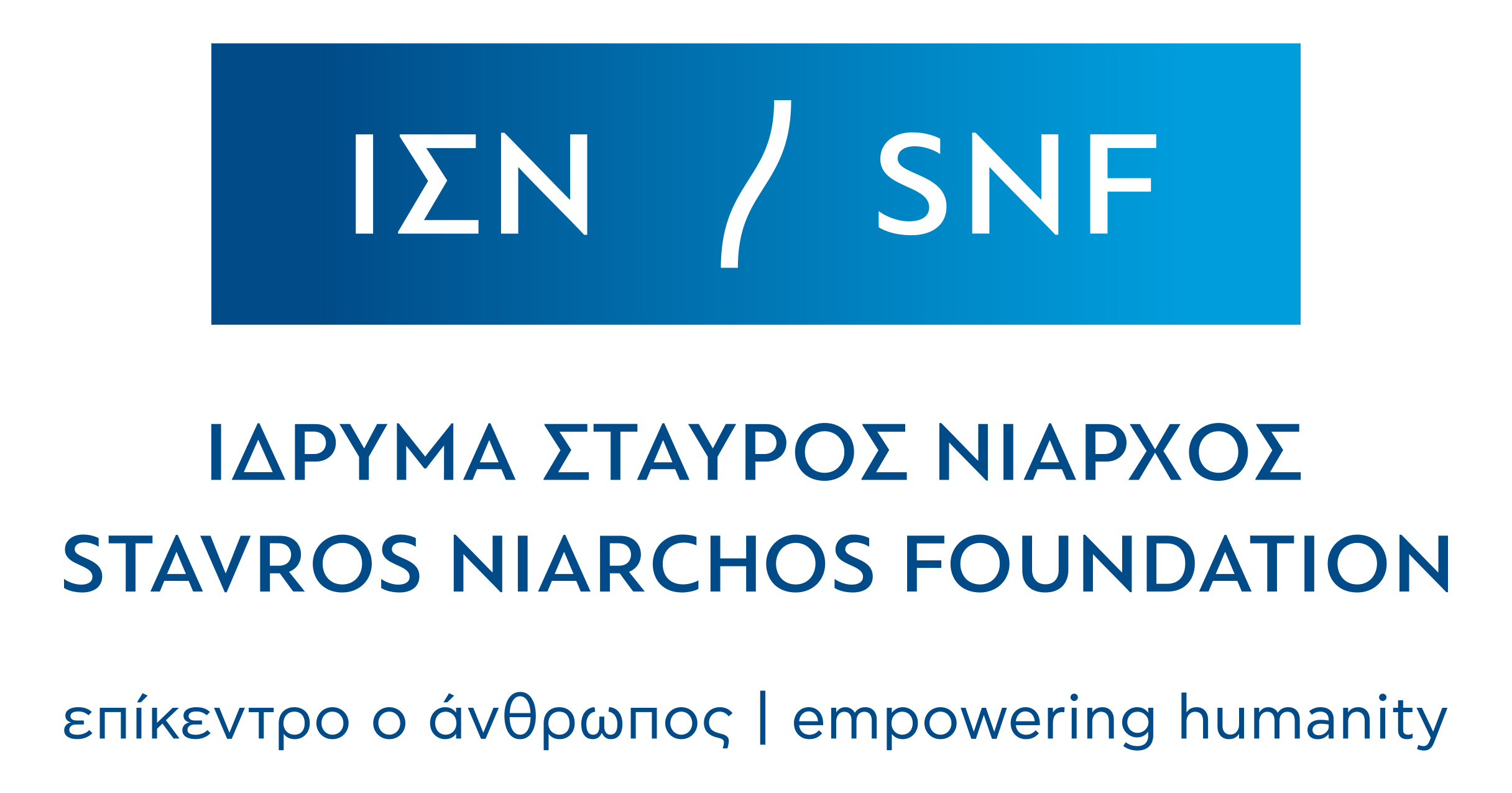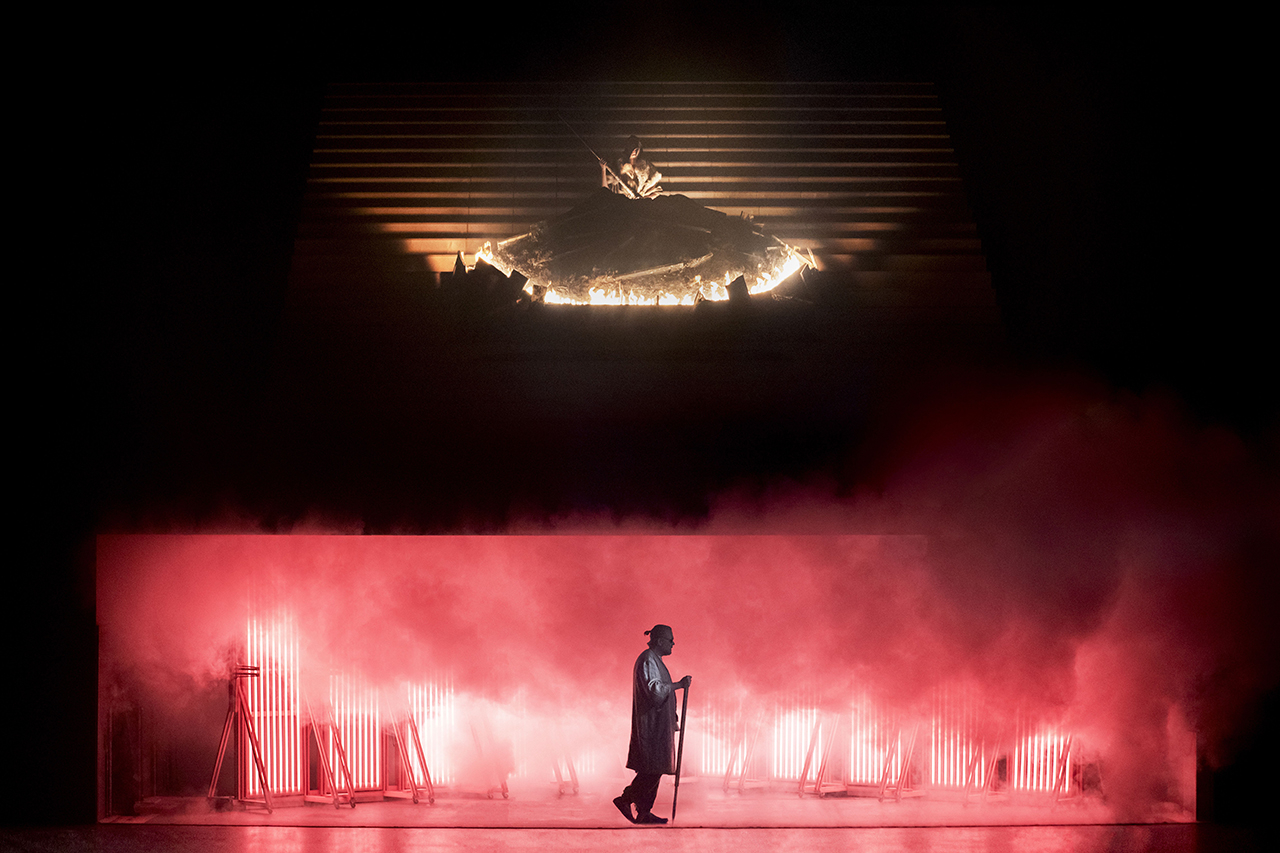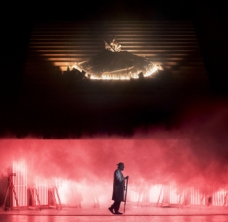
�
Lead Donor of the GNO & Production donor

�
Production sponsor

�
�
The Greek National Opera presents, for the first time in its history, one of the most popular operas in the repertoire: Richard Wagner's masterpiece Die Walküre, in a co-production with the Royal Danish Opera. From 10 March and for a run of six performances in the Stavros Niarchos Hall, conducted by�Roland Kluttig and directed by John Fulljames. The production is made possible by a grant from the Stavros Niarchos Foundation (SNF) to enhance the Greek National Opera's artistic outreach.
Die Walküre (The Valkyrie) is the first of Wagner's works to be presented in Greek National Opera's new home at the SNFCC. It is the second part of the tetralogy Der Ring des Nibelungen (The Ring of the Nibelung) by Richard Wagner and, most certainly, the most popular one. Quite often Die Walküre is presented independently, as it features fascinating and enchanting music of the highest quality, being regarded as a moving yet dramaturgically condensed work. The composition of this colossal opera, fashioned after Aeschylus' Oresteia trilogy, preoccupied Wagner for many years. It sprang from the ideological ferment that held sway in the Germanic sphere during the mid-19th century, in which the composer was enmeshed from 1841 through until 1849, while living in Dresden.
Drawing his inspiration from northern European legends, Wagner -who also penned the libretto- wanted to critique the early-industrial society of his time, the institution of marriage, and power relations through his Ring cycle. In music terms, Die Walküre is an intensely dramatic work that introduced many musical innovations; it would shape the future course of the art form and influence generations of composers to come. The �Ride of the Valkyries� remains famous to this day - a piece used by Francis Ford Coppola in his 1979 feature film Apocalypse Now.
The Greek National Opera entrusted the direction of its first production of Die Walküre to distinguished British director, John Fulljames, who had previously directed GNO's productions of Don Giovanni and Gianni Schicchi. Following the completion of his term as artistic director of the Royal Danish Opera, Fulljames took over the position of Director of the Humanities Cultural Programme at Oxford University. He has directed at the world's leading opera houses, such as La Scala in Milan, Covent Garden, Teatro Real in Madrid, Gran Teatre del Liceu in Barcelona, Théâtre du Châtelet in Paris, etc. The director notes about the production: �We set the opera in a fictional universe which holds in balance the mythic and the real. This world resonates with today without being tied down to a time and place. The central character of this opera is really Wotan - as he comes to terms with the consequences of his choices, realising his grand scheme will collapse and that he must abandon first his son and then his daughter, and face forward to his death. The death though is not just his own - there is also a broader ecological context as the world he has exploited faces a death. We see him as holding 21st-century power - so not a 19th-century industrialist, as he has so often been seen, but instead a creative entrepreneur; perhaps an architect or the leader of a vast media empire.�
The creative team comes complete with associate director Johanne Holten, set and costume designer Tom Scutt, associate set designer David Allen, and lighting designer D. M. Wood.
Directing the orchestra is the distinguished German conductor Roland Kluttig, known for his expertise in the Wagnerian oeuvre. Roland Kluttig conducts operas and concerts with a wide-ranging repertoire worldwide. A particular focus of his work are the compositions of Schumann, Wagner, Berg, Debussy, Janáček, and Sibelius. After the very successful productions of Dukas' Ariane et Barbe-Bleue and Szymanowski's Król Roger at the Graz Opera, he served as principal conductor there from 2020 to 2023. During his time as General Music Director at the Landestheater Coburg (2010-2020), the productions of Wagner's Lohengrin and Parsifal attracted national interest. He was nominated as Conductor of the Year by Opernwelt magazine for his conducting of Beethoven's Fidelio. Since 2000, he has enjoyed a close collaboration with the Stuttgart State Opera. He has also been invited as a guest conductor at the Frankfurt Opera, Salzburg Festival, Hamburg State Opera, Leipzig Opera, Mannheim National Theatre, Opéra Nice C?te d'Azur, and Opéra national du Rhin. Moreover, he has worked with many prestigious orchestras in concerts all over the world and has an extensive collection of recordings.
The Greek National Opera has secured world-class leading Wagnerian singers for the exceptionally demanding main roles in the work.
Performing as Siegmund will be Stefan Vinke, one of the most acclaimed German tenors of our time. He has sung all the great Wagnerian tenor roles, and since 2006, when he made his debut with the Cologne Opera as Siegfried in Der Ring des Nibelungen, he has performed this role more than 30 times in productions of the opera of the same title, and over 25 times in Götterd?mmerung. He has performed numerous times in Der Ring's tetralogy in the world's greatest opera houses, including the Bayreuth Festival, Paris Opera, Royal Opera House in London, New York Metropolitan Opera, Gran Teatre del Liceu, Teatro Real in Madrid, Vienna Opera, Berlin Opera, Opera Australia, etc.
The celebrated Greek bass Petros Magoulas, who will perform as Hunding, has sung at esteemed venues in Greece and abroad, including the Royal Opera House in London, Kiel Opera House, Welsh National Opera, Bilbao Opera, and the Israeli Opera, portraying a diverse range of characters such as Méphistophélès (Faust), Sarastro (Die Zauberflöte), Osmin (Die Entführung aus dem Serail), Don Giovanni and Commendatore (Don Giovanni), King Heinrich (Lohengrin), Daland (Der fliegende Holl?nder), etc. He has also performed a wide range of concert works and pieces of religious music. His recordings include internationally awarded renditions of Handel's works under the baton of George Petrou.
The role of Wotan will be performed by Finnish baritone Tommi Hakala. He was a member of the Nürnberg Opera ensemble, where he performed many leading roles. In the years he was working with the Leipzig Opera, he gained further acclaim portraying characters such as Count Almaviva in Le nozze di Figaro and Chorèbe in Berlioz's Les Troyens. From 2008 to 2013 he was member of the roster of the Finnish National Opera, where he expanded his repertoire with roles such as the Wagnerian Amfortas in Parsifal and Kurwenal in Tristan und Isolde. He has an impressive repertoire that spans across Wagner, Verdi, Mozart, Tchaikovsky, and more. He has also taken the stage at renowned opera houses such as the New York Metropolitan Opera, Teatro Real in Madrid, Dutch National Opera in Amsterdam, and other venues in Strasbourg, Montpellier, Turin, Essen, etc. After his appearance in Athens at the GNO, he will make his way to Australia to portray Wotan in November 2024.
In the role of Sieglinde we encounter the exceptional British dramatic soprano Allison Oakes, whose repertoire includes a wide range of roles that require diverse vocal and acting skills, such as Leonora in Il trovatore, Marie in Wozzeck, the Wagnerians Brünnhilde, Sieglinde and Isolde, Strauss' Salome and more. She has successfully performed as Sieglinde in the Dresden and Rome opera houses. She often performs in the world's most illustrious opera houses, in America, Italy, Portugal, Japan, Korea, and Germany, where she is based.
Catherine Foster has been established as one of the best Brünnhildes in the world today and she has excelled in the Wagnerian repertoire like very few performers have. Following her successful Greek debut in the Callas at the Herodium Gala in September 2023, the great dramatic soprano now returns to the Greek National Opera as Brünnhilde. Foster has showcased outstanding renditions of dramatic roles such as Elektra, Turandot and Isolde, making her mark in the world's top opera houses, in Barcelona, Madrid, Bologna, Amsterdam, Washington, Budapest, Berlin, Hamburg, Dresden, Helsinki, Tokyo, Shanghai, etc. She has been considered as one of the leading protagonists of the Richard Wagner Opera Festival in Bayreuth over the last ten years. During the 2022/23 season, she made her debut with the Victorian Opera in Australia as Elektra, the San Carlo Theatre in Naples as Isolde, and the Royal Opera House in London as Turandot.
Mezzo-sopranos Marina Prudenskaya and Hanne Fischer will be alternately performing as Fricka.
This will be the fifth production where the Russian mezzo-soprano Marina Prudenskaya will be singing this role. In 2018 she performed Fricka at the Bayreuth Festival in a production directed by Frank Castorf and conducted by Plácido Domingo. She made her debut at the Stanislavski Theatre in Moscow and then starred in productions at the world's most prestigious opera houses, such as the Paris Opera, Royal Opera House in London, Teatro Real in Madrid, the Zürich and Berlin Operas, the Aix-en-Provence Festival, etc.
The multi-awarded Danish mezzo-soprano Hanne Fischer, who first appeared as Fricka in Strasbourg in 2008, performs a particularly wide repertoire, spanning from baroque to Wagner and present-day music. She often performs at the Royal Danish Opera and other European opera houses, such as the Kiel Opera House, whose roster she had joined in the past, and the Berlin, Hamburg, Antwerp, Ghent Operas, etc.
Katherina Sandmeier will be performing as Helmwige, Violetta Lousta as Gerhilde, Taxiarchoula Kanati as Ortlinde, Nefeli Kotseli as Waltraute, Dimitra Kalaitzi-Tilikidou as Siegrune, Fotini Athanassaki as Ro?wei?e, Anna Tselika as Grimgerde, and Chrysanthi Spitadi as Schwertleite.
�
Die Walküre at a glance
The opera
Die Walküre (The Valkyrie) is the second music drama of the stage festival epic work Der Ring des Nibelung (The Ring of the Nibelung), which consists of the one-act opening part Das Rheingold (The Rhinegold) and the three-act operas Die Walküre, Siegfried and Götterd?mmerung (Twilight of the Gods).
The composer
Richard Wagner was born in Leipzig in 1813, the same year as Giuseppe Verdi. He is a unique case among 19th-century composers and an emblematic figure of German Romanticism, as his actions and creative work had a profound impact on the thought, arts, and letters, not only of his time, but also of subsequent periods. He wrote theoretical essays, as well as librettos for all of his stage works, envisioning an art beyond mere entertainment and with a didactic purpose, modelled on ancient Greek drama. He imagined and created an ideal theatre building for presenting his music dramas, surrounded by nature and far from the extravagance of big cosmopolitan cities. The groundbreaking structure of his texts, and especially his musical innovations (harmony, prosody, use of Leitmotive, etc), compelled his colleagues to revisit the entire art of music through a different lens. He passed away in Venice in 1883. Among his most important works are: Der fliegende Holl?nder (The Flying Dutchman, 1843), Tannh?user (1845/61), Lohengrin (1850), Tristan und Isolde (Tristan and Isolde, 1864), Die Meistersinger von Nürnberg (The Mastersingers of Nuremberg, 1867), Der Ring des Nibelungen (The Ring of the Nibelung, 1876), Parsifal (1882).
Premieres
Die Walküre (The Valkyrie) was first performed at the Royal Court and National Theatre in Munich on 26 June 1870. It was staged for the first time as part of the Ring Cycle at the Bayreuth Festspielhaus on 14 August 1876. In Greece it was given its premiere by the Frankfurt Opera on 27 November 1938 at Rex Theatre, on Panepistimiou street, as part of Der Ring des Nibelungen.
Synopsis
�
Act I
Hunted down by his enemies in the midst of a storm, Siegmund finally arrives at an unknown house, utterly exhausted. Sieglinde finds him lying down next to the hearth. The two of them are instantly drawn to each other. They are interrupted by Sieglinde's husband, Hunding, who wants to know the stranger's identity. Siegmund, calling himself �woeful� (Wehwalt), tells the story of his tumultuous life and finds out that Hunding is related to his enemies. Hunding announces to his guest that they will engage in a fight to the death the following morning.
Alone, Siegmund calls upon his father, W?lse, asking him for the sword he had been promised long ago. Sieglinde returns after giving Hunding a sleep-inducing potion. She recounts to Siegmund her wedding day, when a one-eyed man thrust a sword into a tree trunk, making it impossible for anyone else to remove it ever since. Sieglinde confides her misfortune to Siegmund. He embraces her and promises her to set her free from her forced marriage to Hunding.
Sieglinde asks him once again who he is. When Siegmund tells her that his father's name was W?lse, she realises that he is her twin brother and that the sword was destined for him. Indeed, Siegmund draws the sword from the tree trunk and claims Sieglinde as his bride.
�
Act II
On the top of a mountain, Wotan, the leader of the gods, tells his warrior daughter Brünnhilde, one of the nine Valkyries, that she must defend his mortal son Siegmund in the upcoming duel with Hunding. But then, Fricka, Wotan's wife and goddess of marriage, appears. She insists that Wotan must defend the rights that come with marriage and, therefore, Hunding, not Siegmund. She dismisses Wotan's argument that Siegmund could save the gods by retrieving the all-powerful ring of Nibelung Alberich from the dragon Fafnir. When Wotan realises that he has fallen into his own trap, as disobeying the law would result in losing his power, he succumbs to his wife's demands. After Fricka has left, Brünnhilde comes back. Wotan, frustrated, tells her the story of how the gold was seized from Rhein and how Alberich cast a curse upon whoever bears the ring forged from it. Brünnhilde is shocked to hear her father ordering her to fight for Hunding.
Siegmund comforts his frightened wife and sister and keeps a watchful eye on her while she falls asleep. Brünnhilde appears to him in a vision, telling him that he will soon die and will follow her to Valhalla, the gods' dwelling place. He answers that he will not leave Sieglinde and threatens to kill her and himself, if his sword fails to protect him from Hunding. Overpowered by emotion, Brünnhilde decides to defy Wotan and help Siegmund. Siegmund bids Sieglinde farewell as he hears Hunding approaching. The two men start fighting. The moment Siegmund is ready to strike the final blow on his opponent, Wotan appears and breaks his sword into pieces, leaving him to get killed by Hunding. Brünnhilde and Sieglinde manage to escape with the broken sword. Wotan ends Hunding's life with a contemptuous gesture and sets off to punish Brünnhilde for her disobedience.
�
Act III
The eight warrior-sisters of Brünnhilde reach the peak of the mountain, carrying fallen heroes to Valhalla. Taken aback, they see Brünnhilde and a woman, Sieglinde, arriving side by side. When they hear that she is trying to evade Wotan's wrath, they hesitate to offer her refuge. Sieglinde is overwhelmed with despair until Brünnhilde tells her that she is carrying Siegmund's child in her womb. After that, in an effort to save herself, she takes the broken pieces of the sword from Brünnhilde, thanks her and escapes to the woods to hide from Wotan. When the god appears, he condemns Brünnhilde to become mortal, dismissing any of her sisters' objections and threatening them that they will face the same punishment, if they get in the way. When she stays alone with her father, Brünnhilde tells him that she only disobeyed his orders because she knew it was what he truly desired. Wotan doesn't give in: he will immerse her into a deep sleep and she will belong to whichever man awakens her. Nevertheless, she asks him to protect her: she asks him to surround her with a wall of fire, one that only the bravest man could cross. They both feel that this hero should be the boy that Sieglinde will give birth to. Bidding farewell to his beloved daughter with a heavy heart, Wotan plunges her into a deep sleep and makes her mortal, before calling Locke, the god of fire, to surround the rock she sits upon with flames.
�
Helena Matheopoulos, author and associate editor of the magazine �Opera Now�, will give a speech titled �Wagner and Greece� at the VIP Lounge of the GNO (1st�floor, foyer) in the SNFCC,�on Saturday 9 March 2024, at 19.00,�on the occasion of the production of Richard Wagner's�Die Walküre. Admission will be free for the public with vouchers distributed exclusively via ticketservices.
In her speech, Helena Matheopoulos will focus on Richard Wagner's passion for ancient Greece. Drawing on a wealth of audiovisual content and writings from the celebrated German composer, she shall shed light on the key elements of Greek culture that hold a prominent position in his work and creative output.














